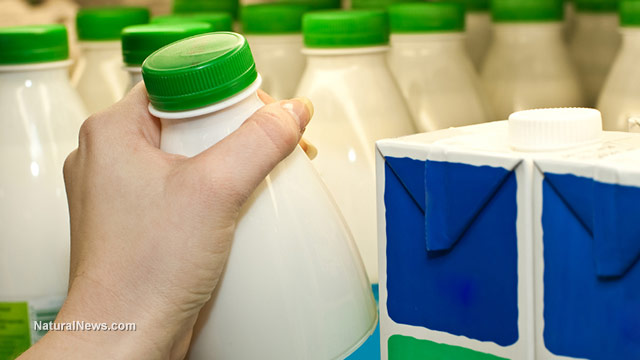Top Harvard nutritionist warns processed milk is dangerous, food pyramid is 'udderly ridiculous'
Tuesday, August 02, 2016 by: Ethan A. Huff, staff writer
Tags: milk, USDA food pyramid, health myths

(NaturalNews) In order to maintain strong bones and promote good health, you need to drink three glasses of milk every single day – at least according to official U.S. Department of Agriculture (USDA) guidelines. But one of the world's top scientists says this is horrible advice, calling it "udderly ridiculous," and out of step with what we know about sound nutrition.
Dr. Walter Willett, M.D., Ph.D., from the Harvard School of Public Health, is the second-most cited scientist in the entire field of clinical medicine, so he knows what he's talking about. And government recommendations concerning milk intake, he says, are absolute bunk, and shouldn't be adhered to by anyone looking to reduce his risk of bone fractures.
There are a lot of reasons for this, one being that "milk" today is nothing but a highly-processed, milk-like substance that's been heavily altered through pasteurization, homogenization and the addition of synthetic vitamins and minerals, making it a processed food that provides little in the way of actual nutrition. But beyond this, the idea that drinking processed milk somehow strengthens bones is an industry myth.
According to Dr. Mark Hyman, M.D., a leading nutrition expert, milk and dairy products in general are something that people should avoid at all costs. Not only is milk a pro-inflammatory food (at least the processed kind), but it's also counter-intuitive in terms of strengthening bones and reducing one's risk of disease, and here are some reasons why:
1) The calcium in milk isn't as bone-protective as we've all been led to believe. Studies show that vitamin D, magnesium and other nutrients are more important for strengthening bones than calcium. And the calcium in milk, when consumed by itself, may actually increase one's risk of bone problems.
2) Processed dairy lacks the enzymes needed for proper digestion. When milk is pasteurized, the lactase enzyme that digests lactose is destroyed, which is why many people now suffer from lactose intolerance, and can't stomach dairy products without supplemental support.
3) Drinking processed milk can actually increase your risk of cancer. That's right, the calcium in milk has been shown to increase a man's risk of prostate cancer by up to 50 percent. Milk consumption also increases levels of insulin-like growth factor-1, or IGF-1, a hormone that's known to promote the development of cancer.
Don't bother with the USDA's food pyramid; it's garbage
Dr. Willett is also outspoken in condemning the USDA's food pyramid as a whole, which recommends heavy intake of carbohydrates and low intake of fats, two pieces of advice that constitute a recipe for chronic disease and death. The pyramid also pushes the low-calorie myth, failing to differentiate between the types of calories consumed, and how they affect the body differently.The scientific consensus is finally switching to an understanding that calories aren't what we need to look at, but rather the ratios of the types of foods we eat, and when we eat them. We now know that saturated fats are actually good for the body, and should be consumed in high amounts along with clean proteins, complex carbohydrates in the form of whole vegetables and lots of hydration.
Sugars, grains, artificial sweeteners and additives, and low-fat foods, on the other hand, only fuel inflammation and weight gain, leading to chronic health problems in the long run. Salt, which has long been vilified, is another important nutrient that you need as part of your diet, just so long as it's unrefined sea or mineral salt.
Check out the new book Food Forensics by Mike Adams, the Health Ranger, to learn more about how to eat better and avoid disease.
Sources for this article include:
DrHyman.com
BMJ.com
Milk at FETCH.news
Get independent news alerts on natural cures, food lab tests, cannabis medicine, science, robotics, drones, privacy and more.
Take Action: Support Natural News by linking to this article from your website
Permalink to this article:
Embed article link: (copy HTML code below):
Reprinting this article:
Non-commercial use OK, cite NaturalNews.com with clickable link.
Follow Natural News on Facebook, Twitter, Google Plus, and Pinterest
- Newly released JFK files reveal Pentagon's role in creating Lyme disease and covid in the same lab
- Trump nominates VACCINE ZEALOT Susan Monarez to lead the CDC, sidelining RFK Jr.'s reform efforts
- BEWARE: USDA allows genetically engineered vaccines to infiltrate organic food production
- Obama accused of laundering USAID funds to fuel global protest movements, regime change operations
- Festive flavors: The sweet history, nutritional profile and health benefits of pecan pie
- Dr. Mike Yeadon releases 15-minute testimony - WATCH - about genocidal intent of COVID “vaccines”
- Elon Musk: Aliens could be here on Earth RIGHT NOW
- Analysis: The coming economic collapse, a mass uprising and Trump's three secret weapons to halt the growing revolt
- Big Pharma's media takeover: How drug companies bought the news - and your health
- Survival 101: Effective EMF blocking techniques
- Trump reverses course on Gaza plan, says “nobody is expelling Palestinians”
- California's social media censorship law struck down: A victory for free speech or a threat to online safety?
- Rep. Nancy Mace introduces bill to ban biological males from female facilities on federal property
- HUGE: Putin claims 2020 election fraud in U.S. sparked Ukraine war, calls for peace talks with Trump
- Reclaim your health: How midlife exercise reverses years of inactivity
- Big Pharma's $8 Billion bribery scheme exposed: how doctors are pushed to prescribe junk science, not heal
- Pilots report mysterious lights 'moving at extreme speeds' across Oregon skies
- Chris Rufo finally reveals abuse liberals unleashed on his wife and young kids...
- Elon Musk: Aliens could be here on Earth RIGHT NOW
- EPA advisor admits the agency is funneling billions to climate groups ahead of Trump’s return to White House
- Trump reverses course on Gaza plan, says “nobody is expelling Palestinians”
- Reclaim your health: How midlife exercise reverses years of inactivity
- A lack of integrity in Academia: Harvard professor found GUILTY of fraudulent research to promote CRT theory
- Space war brewing? Russia threatens to destroy Starlink satellites
- Big Pharma's $8 Billion bribery scheme exposed: how doctors are pushed to prescribe junk science, not heal
- Mike Adams Sermon 66: God will DESTROY ISRAEL for its wickedness
- Rep. Nancy Mace introduces bill to ban biological males from female facilities on federal property
- Survival 101: Effective EMF blocking techniques
- 5 Simple steps to boost your brainpower: How to strengthen executive function in a distracted world
- Historian warns Israel may be entering an “IRREMEDIABLE DECLINE”
- Florida takes a stand: DeSantis proposes permanent ban on mRNA vaccine mandates
- RFK Jr.'s SSRI antidepressant investigation sparks liberal meltdown, exposes Big Pharma's dangerous game
- New York politicians push bill allowing governor to indefinitely detain the unvaccinated on a whim
- Sales of survival bunkers rise following Russia’s use of the Oreshnik hypersonic ballistic missile
- Pilots report mysterious lights 'moving at extreme speeds' across Oregon skies
- Newly released JFK files reveal Pentagon's role in creating Lyme disease and covid in the same lab
- EPA advisor admits the agency is funneling billions to climate groups ahead of Trump’s return to White House
- The Health Ranger releases “Vaccine Zombie” song and music video, using AI-animated zombies for the music video
- The pandemic as a tool for INDOCTRINATION: Understanding “The Indoctrinated Brain” by Dr. Michael Nehls
- California's social media censorship law struck down: A victory for free speech or a threat to online safety?
- Dr. Mike Yeadon releases 15-minute testimony - WATCH - about genocidal intent of COVID “vaccines”
- Congratulations to the FULLY UNVACCINATED as you resisted the COVID-19 PROPAGANDA MACHINE fueled by over $100 BILLION
- Mike Adams releases country western hit single: Goin’ Back in Time is Comin’ Home
- RFK Jr. clears key hurdle: Sen. Susan Collins backs controversial HHS nominee, signaling a new era for health policy
- Mike Adams releases music poetry sensation: A Child of God
- Mike Adams releases new song and music video: Nothing More Disgusting Than a Globalist
- Unpacking the Lies That We’ve Been Fed – new song and music video released by Mike Adams, the Health Ranger
- Trump administration takes on global censorship: A new frontier for free speech advocacy
- Florida takes a stand: DeSantis proposes permanent ban on mRNA vaccine mandates
- “Why we influenced the 2020 elections”: Facebook files reveal the coordinated effort to bury the Hunter Biden laptop story
- Ex-FBI Chief EXPOSES disgraceful government coverups of Oklahoma City Bombing, Kennedy assassinations, 9/11 WTC, and "Terrorism" as plot to destroy Constitution
- Michigan sheriff announces criminal investigation into 2020 election crimes, Dominion Voting Systems
- Israeli soldiers accused of even more torture and abuse in the West Bank
- Federal judge backs Trump's mass firings, clearing path for government downsizing
- Red Cross issues warning to stop blood plasma donations from vaccinated people
- Scientists confirm: GENIUS brain function can be spontaneously unleashed in humans without any apparent cause
- EPA advisor admits the agency is funneling billions to climate groups ahead of Trump’s return to White House
- HYSSOP: What research reveals about the health benefits of this ancient holy herb
- Two containers with completed ballots fall out of truck in Florida
- Fully vaccinated about to see “tsunami” of illness and death, warns virologist
- Today I asked our AI language model “Neo” about which phytonutrients or phytochemicals can block the spike protein related to SARS-CoV-2 … Here is what it answered…
- Global leaders unite to clamp down on “misinformation” with UN-backed Cascais Declaration
- BREAKING: 2025 NDAA authorizes mandatory military draft of WOMEN across America… as Pentagon pursues global NUCLEAR war with both Russia and China at the same time
- Michael Yon warns of a ZIONIST TAKEOVER in Trump’s second administration
- BOMBSHELL: DNA testing kits are a SCAM to develop ethnic-specific bioweapons
- Ozempic and Wegovy weight loss drugs are injectable LIZARD VENOM PEPTIDES that may unleash a devastating wave of organ failure… side effects align with symptoms of SNAKE BITES
- Israeli soldiers accused of even more torture and abuse in the West Bank
- These 13 countries just signed an agreement to engineer a global FAMINE by destroying food supply
- NASA admits that climate change occurs because of changes in Earth’s solar orbit, and NOT because of SUVs and fossil fuels
- RFK Jr. clears key hurdle: Sen. Susan Collins backs controversial HHS nominee, signaling a new era for health policy
- Sermon 30: How Jesus reveals Caesar’s FAKE CURRENCY and FALSE AUTHORITY
- Coriander seeds: Ancient medicine backed by modern science
Science News & Studies
Medicine News and Information
Food News & Studies
Health News & Studies
Herbs News & Information
Pollution News & Studies
Cancer News & Studies
Climate News & Studies
Survival News & Information
Gear News & Information
News covering technology, stocks, hackers, and more



"Big Tech and mainstream media are constantly trying to silence the independent voices that dare to bring you the truth about toxic food ingredients, dangerous medications and the failed, fraudulent science of the profit-driven medical establishment.
Email is one of the best ways to make sure you stay informed, without the censorship of the tech giants (Google, Apple, Facebook, Twitter, YouTube, etc.). Stay informed and you'll even likely learn information that may help save your own life."
–The Health Ranger, Mike Adams












































